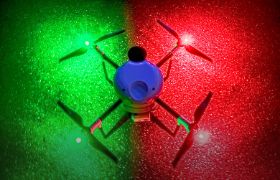World first in Antwerp port area: drone network officially launched
Six autonomous drones will perform daily flights in the Antwerp port area, a world first that will make an important contribution to overall security of the complex port environment. Launched, today, the "D-Hive drone-in-a-box" network is the result of a partnership between the Port of Antwerp-Bruges, DroneMatrix, SkeyDrone and Proximus.
Six extra pairs of eyes
The Antwerp port area is more than 120km², an area that will now be covered by the D-Hive network of six autonomous drones. They will provide extra pairs of eyes to help coordinate smooth, safe and sustainable operations in this complex environment. The drones will offer a unique perspective from the air and enable the port authorities to manage, inspect and supervise a large area, quickly and effectively. The port will use the drones for a range of functions including berth management, monitoring, infrastructure inspections, oil spill and floating waste detection, and to support security partners during incidents. The 18 daily BVLOS (Beyond Visual Line of Sight) drone flights will be remotely controlled from a Command and Control Centre in the heart of the port.
World first
This is the first implementation worldwide of BVLOS flights on this scale in a complex industrial environment. Unlike VLOS (Visual Line Of Sight) flights, these will take place out of the pilot's sight. Port of Antwerp-Bruges is working with partners DroneMatrix, SkeyDrone and Proximus for the D-Hive network. Two months ago, the partners were given the green light to launch the drone network. This operational permit was built around a new BVLOS framework (known as pre-Uspace airspace), built by Skeydrone and approved by the BCAA (Belgian Civil Aviation Authority) and EASA (European Union Aviation Safety Agency), as a appropriate and safe framework for BVLOS drone flights.
Live feed of port activities
Port of Antwerp-Bruges had planned a network of autonomous drones in 2019 because of their ability to play in helping create the port of the future. Several tests have taken place and there was participation in the SAFIR project to investigate the feasibility of drones at the port. As a result, the ambition of a network of autonomous drones is now a reality.
Given the huge surface area of the port, drones provide us with leverage when it comes to carrying out our core tasks as a port authority. This drone network will play a crucial role in the further roll-out of the port's digital twin, a digital copy based on thousands of pieces of data from a network of cameras, sensors and drone, giving a real-time picture of what is happening at the port every second. This first takes us an important step further in developing a fully digital nervous system that will help us manage our port more efficiently and make traffic even safer and smoother.
We are going all out to make our port – the engine of our economy – run as safely, cleanly and smoothly as possible. Thanks to this drone network, we will have a more accurate sense of what is going on at the port as we, along with our innovative partners, work towards the achievement of a safe, efficient and smart port – the port of the future.
We are proud that customers like the Port of Antwerp-Bruges select DroneMatrix as the drone technology expert and end-to-end partner for the implementation of this large-scale drone network within the Port of Antwerp. This proves that DroneMatrix has built up top expertise over the years with a strong strategic vision around fully in-house developed hardware and software products and services. Furthermore, DroneMatrix can rely on a strong ecosystem of Belgian partners to deliver this drones-as-a-service (DAAS) application in the most complex and demanding infrastructures. In this, DroneMatrix acts as a Belgian champion with a central position and makes connections in the diverse ecosystem of drone-related companies. Finally, we are excited to prove and further commercialise the strong added value of our unmanned aerial robotics in the coming period.
A seaport is probably one of the most difficult areas to fly drones. Especially when flying beyond visual line of sight (BVLOS). SkeyDrone therefore developed the "BVLOS framework" that ensured that these D-Hive drones can be deployed daily in a safe and scalable way. This framework now serves as the template for the future U-space airspace, for which again the Port of Antwerp Bruges will pioneer.

We are proud to be contributing to the general safety and operational efficiency in one of Belgium’s most important economic growth engines. This newly launched network of autonomous drones will help the port authority in its day-to-day activities, for example by facilitating the detection of oil spills and floating debris or by supporting the coordination of calamity and incident response operations. It will also benefit the many companies that are active in and around the Antwerp port area in a broader sense. This project shows the potential of our state-of-the-art 5G network, combined with a wide range of software-based services, to boost innovation in our country.

